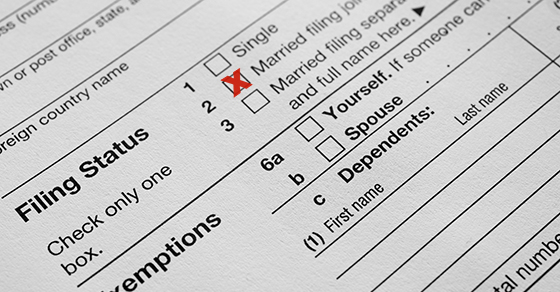4 steps to improving your company’s sales
- ByPolk & Associates
- Oct, 09, 2020
- All News & Information
- Comments Off on 4 steps to improving your company’s sales
Sales staffs have been under unprecedented pressure this year. The COVID-19 pandemic triggered economic changes that made many buyers cut back on spending. With the economy slowly recovering, here are four steps your salespeople can follow to improve their odds of success: 1) Qualify prospects methodically so sales staffers focus most or all their time on those most likely to buy, 2) Ask the right questions, based on research, to identify a prospect’s specific needs, 3) Proactively identify and address objections during sales calls to eliminate unpleasant surprises at closing, and 4) Above all, present a solution that fixes a problem or helps achieve a goal. Contact us for more info.
There may be relief from tax liability for “innocent spouses”
- ByPolk & Associates
- Oct, 09, 2020
- All News & Information
- Comments Off on There may be relief from tax liability for “innocent spouses”
If you file a joint tax return with your spouse, you should be aware of your individual liability. And if you’re getting divorced, you should know that there may be relief available if the IRS comes after you for certain past-due taxes. When a married couple files jointly, each spouse is liable for the tax on their combined income. That means the IRS can come after either spouse to collect the entire tax, penalties and interest, not just the part that’s attributed to that spouse. In some cases, spouses are eligible for “innocent spouse relief.” Generally, they were unaware of a tax understatement that was attributable to the other spouse. Contact us if you want to try and obtain relief.
The easiest way to survive an IRS audit is to get ready in advance
- ByPolk & Associates
- Oct, 09, 2020
- All News & Information
- Comments Off on The easiest way to survive an IRS audit is to get ready in advance
IRS audit rates are historically low, according to the latest data, but that’s little consolation if your return is selected. But with proper preparation and planning, you should fare well. But it helps to know what might catch the attention of the IRS. For example, some audit “red flags” are unusually high deductions, major inconsistencies between previous years’ tax returns and the current one, profit margins and expenses markedly different from those of similar businesses. The IRS normally has three years within which to conduct an audit. If the IRS selects you for an audit, we can help you understand the issues, gather the needed documents and respond to the inquiries effectively.
Reinforce protection of your company’s mobile devices
- ByPolk & Associates
- Oct, 09, 2020
- All News & Information
- Comments Off on Reinforce protection of your company’s mobile devices
Mobile devices have become the constant companions of today’s employees, a relationship only further cemented by the COVID-19 pandemic. But convenience brings risk. In the current economy, thieves may be trying harder to snatch technological assets. And a stolen or hacked device means hackers could gain possession of sensitive, confidential data about your company, customers and employees. To better protect your mobile tech, consider standardizing product types and operating systems. Also, enforce strict policies that include “power-on” passwords and regular password changes. Set data storage limits, limit personal use and keep security software updated as well. Contact us for more info.
Why it’s important to plan for income taxes as part of your estate plan
- ByPolk & Associates
- Oct, 09, 2020
- All News & Information
- Comments Off on Why it’s important to plan for income taxes as part of your estate plan
The current federal estate tax exemption ($11.58 million in 2020) means that many people aren’t concerned with estate tax. But they should still plan to save income taxes. For example, be careful making lifetime transfers of appreciated assets. It’s true that the assets and future appreciation generated by them are removed from your estate. But the gift carries a potential income tax cost because the recipient receives your basis upon transfer. He or she could face capital gains tax on the sale of the gifted property in the future. If the appreciated property is held until death, under current law, the heir will get a “step-up” in basis that will reduce or wipe out the capital gains tax.
The tax rules for deducting the computer software costs of your business
- ByPolk & Associates
- Oct, 09, 2020
- All News & Information
- Comments Off on The tax rules for deducting the computer software costs of your business
Do you buy or lease computer software to use in your business? Do you develop software for use in your business, or for sale or lease to others? You should be aware there are complex rules that may apply to determine the tax treatment of the expenses. The rules depend on whether the software is purchased, leased or developed by your business. For example, you must deduct amounts you pay to rent leased software in the tax year they’re paid, if you’re a cash-method taxpayer, or the tax year for which the rentals are accrued, if you’re an accrual-method taxpayer. We can assist you in applying the tax rules for treating computer software costs in the way that is most advantageous for you.
Trump administration bans most evictions through December, but there’s a catch
- ByPolk & Associates
- Sep, 24, 2020
- All News & Information, Real Estate
- Comments Off on Trump administration bans most evictions through December, but there’s a catch
Though a moratorium is in effect, tenants are still obligated to pay rent Citing concern about the spread of the coronavirus, the Trump administration on Tuesday announced a moratorium on most residential evictions through the end of the year. The order, made public by the Centers for Disease Control on Tuesday, will prevent landlords from evicting most tenants […]
Can investors who manage their own portfolios deduct related expenses?
- ByPolk & Associates
- Sep, 24, 2020
- All News & Information
- Comments Off on Can investors who manage their own portfolios deduct related expenses?
In some cases, investors have related expenses, such as the cost of subscriptions to financial periodicals and clerical expenses. Are they tax deductible? Currently, they’re only deductible if you can show that your investment activities rise to the level of carrying on a trade or business. In that case, you may be considered a trader, rather than an investor. A trader is entitled to deduct investment-related expenses as business expenses. A trader is also entitled to deduct home-office expenses if the home office is used exclusively on a regular basis as the trader’s principal place of business. However, be aware that trader status is difficult to achieve. Contact us with questions.
Business website costs: How to handle them for tax purposes
- ByPolk & Associates
- Sep, 24, 2020
- All News & Information
- Comments Off on Business website costs: How to handle them for tax purposes
The business use of websites is widespread. But determining the proper tax treatment for the costs involved in developing a website can be difficult. The IRS hasn’t yet released formal guidance on when website costs can be deducted, so you must apply existing guidance that’s available on other costs to the issue of website development costs. The exact treatment of website design costs depends on whether they’re software or hardware and whether they’re part of a start-up business. If you hire third parties to set up and run your website, payments are currently deductible as ordinary and necessary business expenses. Contact us if you have questions or want to plan for website costs.
IRS announces per diem rates for business travel
- ByPolk & Associates
- Sep, 24, 2020
- All News & Information
- Comments Off on IRS announces per diem rates for business travel
The IRS recently announced special per diem rates that can be used to substantiate business expenses incurred for travel away from home on or after October 1, 2020. Employers using these rates to set per diem allowances can treat the amount of certain categories of travel expenses as substantiated without requiring employees to prove the actual amount spent. For travel within the continental United States, employers can use the optional high-low method for substantiating lodging, meals and incidental expenses, or for substantiating meal and incidental expenses only. The per diem rules can greatly simplify the process of substantiating business travel expenses. Contact us for more info.











You must be logged in to post a comment.